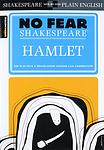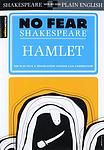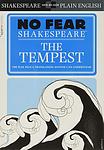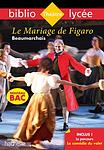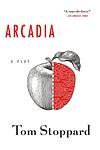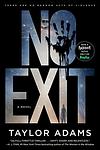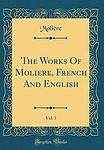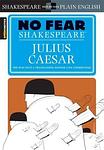The Greatest French, British "Plays" Books of All Time
Click to learn how this list is calculated.
This list represents a comprehensive and trusted collection of the greatest books. Developed through a specialized algorithm, it brings together 301 'best of' book lists to form a definitive guide to the world's most acclaimed books. For those interested in how these books are chosen, additional details can be found on the rankings page.
Genres
Plays are a category of literature that consists of written works intended for performance on stage. They typically feature dialogue between characters and are structured into acts and scenes. Plays can be comedic, tragic, or a combination of both, and often explore themes such as love, power, and morality. They are meant to be performed by actors in front of an audience, and can be enjoyed both as written works and as live performances.
Countries
Date Range
Reading Statistics
Click the button below to see how many of these books you've read!
Download
If you're interested in downloading this list as a CSV file for use in a spreadsheet application, you can easily do so by clicking the button below. Please note that to ensure a manageable file size and faster download, the CSV will include details for only the first 500 books.
Download-
1. Hamlet by William Shakespeare
This classic play revolves around the young Prince of Denmark who is thrown into a state of emotional turmoil after his father's sudden death and his mother's quick remarriage to his uncle. The prince is visited by the ghost of his father who reveals that he was murdered by the uncle, prompting the prince to seek revenge. The narrative explores themes of madness, revenge, and moral corruption as the prince navigates the complex political and emotional landscape of the Danish court.
The 83rd Greatest Book of All Time -
2. First Folio by William Shakespeare
This collection is a compilation of 36 plays by a renowned English playwright, published seven years after his death. It includes comedies, histories, and tragedies, some of which had never been published before. Notable works in the compilation include "Macbeth," "Julius Caesar," "Twelfth Night," "The Tempest," and "As You Like It." The collection is considered one of the most influential books ever published in the English language, as it preserved many of the playwright's works that might have otherwise been lost.
The 124th Greatest Book of All Time -
3. Macbeth by William Shakespeare
This classic play follows the tragic tale of Macbeth, a Scottish general whose ambition is sparked by a prophecy from three witches that he will one day become King of Scotland. Consumed by ambition and spurred on by his wife, Macbeth murders King Duncan and takes the throne. However, guilt and paranoia plague him, leading to a reign of terror and further bloodshed. His desperate attempts to cling onto power lead to his downfall, illustrating the destructive power of unchecked ambition.
The 222nd Greatest Book of All Time -
4. King Lear by William Shakespeare
This classic tragedy revolves around the aging King Lear, who decides to divide his kingdom among his three daughters based on their declarations of love for him. The two elder daughters, Goneril and Regan, flatter him with insincere praises, while the youngest, Cordelia, refuses to play the game and is disowned. As the king's sanity deteriorates, his kingdom falls into chaos under the rule of his deceitful elder daughters. The play explores themes of power, loyalty, madness, and justice, culminating in a tragic ending where almost all the main characters, including King Lear and Cordelia, die.
The 257th Greatest Book of All Time -
5. The Tempest by William Shakespeare
"The Tempest" is a classic play about a sorcerer and rightful Duke of Milan who has been stranded on an island for 12 years with his daughter after being betrayed by his brother. Using his magical powers and the help of an airy spirit, he conjures a storm to shipwreck his brother and other enemies on the island. The narrative explores themes of revenge, power, magic, and forgiveness as the sorcerer manipulates events on the island to regain his dukedom and secure a good future for his daughter.
The 306th Greatest Book of All Time -
6. Tartuffe by Molière
This classic French play revolves around the character Tartuffe, a hypocritical and cunning man who pretends to be deeply pious and religious. He manages to deceive Orgon, a wealthy family patriarch, into believing in his piety. Orgon is so taken in by Tartuffe that he decides to marry him off to his daughter, despite her love for another man. The family works together to expose Tartuffe's true nature, leading to a series of comic and dramatic events. The play is a satirical critique of religious hypocrisy and gullibility.
The 529th Greatest Book of All Time -
7. Cyrano de Bergerac by Edmond Rostand
"Cyrano de Bergerac" is a classic French play that tells the story of a nobleman named Cyrano, who is a talented poet and swordsman but has a very large nose. Despite being deeply in love with his cousin Roxane, Cyrano doesn't believe she could ever love him because of his appearance, so he helps his friend Christian woo her instead. Cyrano writes love letters to Roxane on behalf of Christian, and Roxane falls in love with the man she believes Christian to be. The story is a tragic tale of unrequited love, selflessness, and the power of inner beauty.
The 585th Greatest Book of All Time -
8. A Midsummer Night's Dream by William Shakespeare
In this classic play, the Duke of Athens is preparing for his marriage when the lives of two young couples become complicated by the meddling of fairies. The fairy king and queen, Oberon and Titania, are quarreling, causing chaos in both the fairy world and the world of mortals. Puck, a mischievous sprite and servant of Oberon, causes further confusion and comic misadventures by casting spells that lead to mistaken identities and misplaced affections. Eventually, all is resolved, and the play ends with three happily married couples.
The 636th Greatest Book of All Time -
9. Phèdre by Jean Racine
"Phèdre" is a classic French play that explores themes of love, guilt, and retribution. The story revolves around the tragic heroine, Phèdre, who falls passionately in love with her stepson, Hippolytus. Battling with her forbidden desires, she eventually confesses her feelings to Hippolytus, leading to a series of devastating events. The play is renowned for its exploration of human emotions, moral dilemmas, and the destructive power of uncontrolled passion.
The 659th Greatest Book of All Time -
10. Romeo and Juliet by William Shakespeare
This classic play tells the tragic love story of two young individuals from feuding families in Verona, Italy. Despite their families' ongoing conflict, the pair secretly marry and vow to be together, no matter the cost. Their commitment leads to a series of unfortunate events, including misunderstandings, banishments, and ultimately, their untimely deaths. Their demise, however, reconciles their feuding families, leaving a poignant message about the destructive power of hate and the redemptive power of love.
The 708th Greatest Book of All Time -
11. Othello by William Shakespeare
"Othello" is a tragic play about a Moorish general in the Venetian army who is manipulated by his ensign into believing that his wife is unfaithful. Consumed by jealousy, the general kills his wife, only to discover that she was innocent. Filled with remorse, he then takes his own life. The play explores themes of love, jealousy, betrayal, and racism.
The 711th Greatest Book of All Time -
12. Pygmalion by George Bernard Shaw
"Pygmalion" is a play that explores the transformative power of education and the nature of language and communication. It follows the story of a cockney flower girl named Eliza Doolittle who is taught to speak and behave like a duchess by a pompous phonetics professor, Henry Higgins. Throughout the process, Eliza develops self-respect and personal dignity, challenging the Victorian society's rigid class system. The play also questions the idea of 'making' someone and the moral responsibility that comes with it.
The 875th Greatest Book of All Time -
13. Richard III by William Shakespeare
"Richard III" is a historical play that follows the Machiavellian rise to power and subsequent short reign of its titular character. Richard, Duke of Gloucester, is depicted as a ruthless, power-hungry man who will stop at nothing to take the throne of England, resorting to manipulation, deceit, and even murder. However, his reign is plagued by guilt and insecurity, and his tyranny eventually leads to his downfall and death in battle. The play explores themes of power, corruption, morality, and the consequences of unchecked ambition.
The 935th Greatest Book of All Time -
14. Twelfth Night: Or, What You Will by William Shakespeare
Twelfth Night: Or, What You Will is a comedic play that revolves around mistaken identities and love triangles. The story follows the adventures of Viola, who, after being shipwrecked and separated from her twin brother Sebastian, disguises herself as a man named Cesario. As Cesario, she enters the service of Duke Orsino and falls in love with him, even as he sends her to woo the Countess Olivia on his behalf. However, Olivia falls in love with Cesario, not knowing he is actually Viola in disguise. Further confusion ensues when Viola's presumed-dead brother Sebastian arrives, leading to mistaken identities, hilarious mix-ups, and ultimately, happy resolutions.
The 1186th Greatest Book of All Time -
15. Le Mariage De Figaro by Pierre-Augustin Caron de Beaumarchais
The play is a comedic yet biting commentary on class and privilege, set against the backdrop of a single day in the life of a clever valet named Figaro, who is about to marry his beloved Suzanne. However, their plans are threatened by the Count, who desires Suzanne for himself and aims to exercise his feudal right to bed a servant girl on her wedding night. Through a series of clever maneuvers, secret plots, and humorous twists, Figaro, Suzanne, and their allies outwit the Count and other members of the aristocracy. The play challenges the social norms of the time, including the abuses of the upper classes and the rights of individuals, culminating in a celebration of love and marriage where wit and resourcefulness triumph over rank and power.
The 1225th Greatest Book of All Time -
16. Rosencrantz & Guildenstern Are Dead by Tom Stoppard
The play is an absurdist, existential tragicomedy that follows two minor characters from Shakespeare's "Hamlet," Rosencrantz and Guildenstern, who are now the protagonists in their own story. As they stumble through philosophical debates and encounter a troupe of actors while trying to understand the nature of reality and their own existence, they find themselves increasingly out of their depth in a world where they have little control over their fate. The narrative weaves in and out of events from "Hamlet," offering a humorous and poignant perspective on free will, chance, and the search for meaning in a seemingly indifferent universe.
The 1311th Greatest Book of All Time -
17. Arcadia by Tom Stoppard
"Arcadia" is a play that intertwines two timelines, set in the same English country house but centuries apart. In the early 19th century, a gifted young girl and her tutor delve into intellectual pursuits, exploring mathematics, nature, and the early inklings of chaos theory, while around them, the adults engage in witty repartee, romantic entanglements, and poetic rivalries. In the present day, scholars and descendants of the house's historical residents attempt to piece together the past, often misinterpreting the evidence they find. The play explores themes of time, truth, and the impact of the past on the present, all while showcasing the enduring nature of human curiosity and the quest for knowledge.
The 1421st Greatest Book of All Time -
18. The Imaginary Invalid by Molière
The play is a satirical comedy that centers around Argan, a hypochondriac who obsesses over his health and squanders his fortune on unnecessary medical treatments. His ailment is exploited by charlatan doctors and a greedy wife, while his daughter's marital future hangs in the balance due to his misguided intentions. The story unfolds with a clever servant, Toinette, and Argan's brother, Béralde, attempting to open his eyes to the truth of his condition and the deceit around him. Through a series of humorous events, including a mock ceremony, the play critiques the medical profession and the foolishness of those who blindly follow it, ultimately advocating for common sense and true familial love.
The 1459th Greatest Book of All Time -
19. The Bald Soprano by Eugène Ionesco
"The Bald Soprano" is a play that explores the absurdity of everyday life through a nonsensical narrative. It revolves around two middle-class English couples, the Smiths and the Martins, who engage in meaningless and repetitive conversations. The play is known for its unconventional structure, lack of plot, and the characters' surreal behavior, which are all used to satirize the banality and futility of routine and social norms. The title refers to a character who is never seen or mentioned again after the opening scene.
The 1554th Greatest Book of All Time -
20. She Stoops to Conquer by Oliver Goldsmith
"She Stoops to Conquer" is a comedic play that revolves around the story of a wealthy countryman, Mr. Hardcastle, who arranges for his daughter, Kate, to meet Charles Marlow, the son of a wealthy Londoner, hoping the pair will marry. However, Marlow is nervous around upper-class women, yet gets along fine with lower-class women. Kate learns of this and pretends to be 'common' to get to know him. The play concludes with Kate revealing her true identity, and Marlow, who is in love by this point, is relieved she's actually of the upper class. The play explores themes of class, courtship, and the deceptive nature of appearances.
The 1588th Greatest Book of All Time -
21. The Misanthrope by Molière
"The Misanthrope" is a satirical play that explores the hypocrisy and corruption of French aristocratic society through the eyes of the protagonist, a man who insists on absolute honesty and despises flattery, insincerity, and social conventions. Despite his disdain for society, he falls in love with a coquette who embodies everything he detests, leading to a series of comedic and dramatic situations. The narrative ultimately emphasizes the importance of balance between truth and courtesy in social interactions.
The 1606th Greatest Book of All Time -
22. No Exit by Jean Paul Sartre
The book is a profound existentialist play that delves into the human psyche and the concept of hell through the experiences of three deceased characters who find themselves trapped together in a mysterious, windowless room. As they engage in intense psychological games and confront the worst aspects of their earthly behaviors, they come to the harrowing realization that their torment comes not from any external punishment, but from each other and the eternal company they are forced to keep. The narrative explores themes of freedom, responsibility, and the often unbearable nature of human existence, encapsulated in the famous line, "Hell is other people."
The 1637th Greatest Book of All Time -
23. Rameau's Nephew by Denis Diderot
"Rameau's Nephew" is a philosophical dialogue that explores themes of morality, societal norms, and the nature of genius. The story revolves around a conversation between a philosopher and a character who is the nephew of a famous musician. The nephew, a freeloader and a parasite, defends his lifestyle by arguing that it is not only acceptable but also necessary in a society where wealth and power determine value. The dialogue delves into the contradictions and ironies of social conventions, challenging traditional notions of virtue, vice, and human nature.
The 1640th Greatest Book of All Time -
24. The Works of Moliere by Molière
This book is a compilation of the works of a renowned 17th-century French playwright, who is often considered one of the greatest masters of comedy in Western literature. His plays are known for their satirical examination of social norms and human folly, featuring a range of characters from the foolish and the pedantic to the hypocritical and the corrupt. Some of his most famous works included in this collection are "Tartuffe," "The Misanthrope," and "The Imaginary Invalid."
The 1671st Greatest Book of All Time -
25. Julius Caesar by William Shakespeare
This classic play dramatizes the political and personal machinations surrounding the assassination of a powerful leader. The narrative follows the conspirators' plot, their execution of the plan, and the resulting chaos and war. The themes of ambition, loyalty, and the struggle for power are explored through complex character interactions and memorable soliloquies. The play also examines the consequences of political violence and the unpredictable nature of history.
The 1683rd Greatest Book of All Time
Reading Statistics
Click the button below to see how many of these books you've read!
Download
If you're interested in downloading this list as a CSV file for use in a spreadsheet application, you can easily do so by clicking the button below. Please note that to ensure a manageable file size and faster download, the CSV will include details for only the first 500 books.
Download